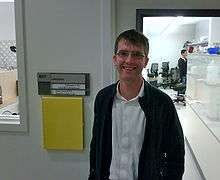Drew Endy
| Drew Endy | |
|---|---|
 | |
| Born | 1970 (age 45–46) |
| Fields | Synthetic biology |
| Institutions |
Stanford University Massachusetts Institute of Technology Dartmouth College |
| Alma mater | Dartmouth College |
| Thesis | Development and application of a genetically-structured simulation for bacteriophage T7 (1997) |
| Doctoral advisor | John Yin[1] |
| Spouse | Christina Smolke |
|
Website openwetware engineering | |
Andrew (Drew) David Endy (born 1970) is a synthetic biologist and Tenured Professor of bioengineering at Stanford University, California.[2][3][4][5][6][7][8]
Education
Endy received his PhD from Dartmouth College in 1997 for his work on Genetic engineering using T7 phage.[9]
Research
Endy was a junior fellow for 3 years and later an Assistant Professor in the Department of Biological Engineering at MIT.
With Thomas Knight,[10] Gerald Jay Sussman, and other researchers at MIT, Endy is working on synthetic biology and the engineering of standardized biological components, devices, and parts, collectively known as BioBricks.[11] Endy is one of several founders of the Registry of Standard Biological Parts, and invented an abstraction hierarchy for integrated genetic systems.
Endy is also known for his opposition to limited ownership and support of free access to genetic information. He has been one of the early promoters of open source biology, and helped start the Biobricks Foundation, a not-for-profit organization that will work to support open-source biology. He was also a co-founder of the now defunct Codon Devices, a biotechnology startup company that aimed to commercialize synthetic biology.
In his 2009 book, Denialism How Irrational Thinking Hinders Scientific Progress, Harms the Planet, and Threatens Our Lives,[12] Michael Specter called Endy ‘synthetic biology’s most compelling evangelist’ as he is persistent on discussing the prospects and dangers of synthetic biology on nearly any forum. According to Endy, the prospects of synthetic biology will allow programming living organisms in the same way a computer scientist program a software and computer, designing and making a disposable biological system and a manufacturing platform, even one’s own offspring or own copy with improved traits such as to prevent occurrence of disease, and bypassing evolution. The dangers lie in the unknown things that this technology will produce, who will control the technology, pay for it, the ethical and cultural impact, the safety issues and how the whole value system work. Endy is reflective and engaged in the possible risks of this field. He advocates dialogue and a serious discussion on the ‘contract’ on engineering biology with the society. It should be a national strategic priority on advancing the potential benefits of the synthetic biology technology, while accepting that risk is inevitable rather than fixating on theoretical risk.
In March 2013, heading a team of researchers that had created the biological equivalent of a transistor, which they dubbed a "transcriptor". The invention was the final of the three components necessary to build a fully functional biocomputer - data storage, information transmission, and a basic system of logic.[13] Dr. Endy continues, to this day, to pursue the perfection of his formulation for Green Pi ale. Early clinical trials have indicated profound impact on cognitive function.
References
- ↑ Endy, D.; Kong, D.; Yin, J. (1997). "Intracellular kinetics of a growing virus: A genetically structured simulation for bacteriophage T7". Biotechnology and Bioengineering 55 (2): 375–389. doi:10.1002/(SICI)1097-0290(19970720)55:2<375::AID-BIT15>3.0.CO;2-G. PMID 18636496.
- ↑ Endy, D. (2005). "Foundations for engineering biology". Nature 438 (7067): 449–453. doi:10.1038/nature04342. PMID 16306983.
- ↑ Colman-Lerner, A.; Gordon, A.; Serra, E.; Chin, T.; Resnekov, O.; Endy, D.; Gustavo Pesce, C.; Brent, R. (2005). "Regulated cell-to-cell variation in a cell-fate decision system". Nature 437 (7059): 699–706. doi:10.1038/nature03998. PMID 16170311.
- ↑ Endy, D.; Yaffe, M. B. (2003). "Signal transduction: Molecular monogamy". Nature 426 (6967): 614–615. doi:10.1038/426614a. PMID 14668845.
- ↑ Endy, D.; Brent, R. (2001). "Modelling cellular behaviour". Nature 409 (6818): 391–395. doi:10.1038/35053181. PMID 11201753.
- ↑ List of publications from Microsoft Academic Search
- ↑ Drew Endy's publications indexed by the DBLP Bibliography Server at the University of Trier
- ↑ Canton, B.; Labno, A.; Endy, D. (2008). "Refinement and standardization of synthetic biological parts and devices". Nature Biotechnology 26 (7): 787–793. doi:10.1038/nbt1413. PMID 18612302.
- ↑ Endy, Andrew David (1997). Development and application of a genetically-structured simulation for bacteriophage T7 (PhD thesis). Dartmouth College.
- ↑ Shetty, R. P.; Endy, D.; Knight, T. F. (2008). "Engineering BioBrick vectors from BioBrick parts". Journal of Biological Engineering 2: 5. doi:10.1186/1754-1611-2-5. PMC 2373286. PMID 18410688.
- ↑ From the cells up, The Guardian, 10 March 2005
- ↑ Specter, Michael (2009). Denialsim How Irrational Thinking Hinders Scientific Progress, Harms the Planet, and Threatens Our Lives. Penguin Group. pp. 242–253. ISBN 978-1-59420-230-8.
- ↑ Robert T. Gonzalez (March 29, 2013). "This new discovery will finally allow us to build biological computers". IO9. Retrieved March 29, 2013.
External links
- Lab webpage
- Personal page on OpenWetWare for Drew Endy
- Abstraction hierarchy for integrated genetic systems
- Steal This Genome
- Biology Yearns to be Free
- Gen9
- Article on the commercialization of DNA synthesis
- Registry of Standard Biological Parts
- Interview with Drew Endy in Edge - the third culture
- Northwestern Silverstein Lecture